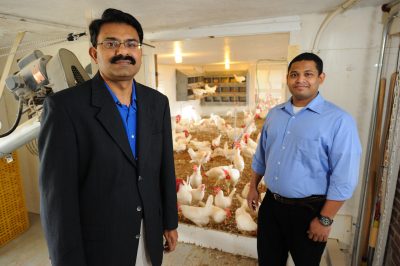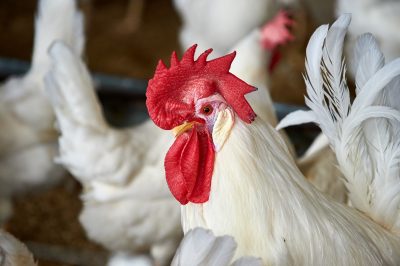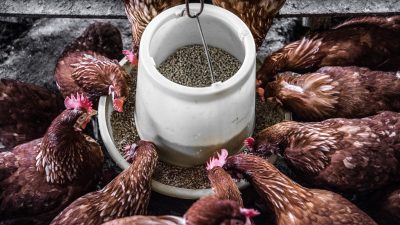About the Project
The U.S. has the largest broiler industry producing 9 billion birds annually. Antibiotics have been an integral part of poultry production contributing in part to the sustained growth of broiler production, where antibiotic growth promoters (AGP's) are used to enhance poultry performance, feed efficiency and general health. Research indicates that antibiotic-restricted production can adversely affect bird health, production efficiency, and the environment. Therefore, in light of the FDA's directive to phase out AGPs in poultry production, it is critical to ensure sustainability of broiler production for meeting future demand.
Goals and Objectives
This project's goal is to promote sustainability of broiler production by targeting three major system components in the poultry sector, namely Chicken, Humans and the Environment. To achieve this, we have assembled an interdisciplinary team of researchers, educators, and extension professionals with the following objectives:
- Control poultry diseases
- Identify alternative feed ingredients
- Enhance bird welfare
- Enhance broiler food safety
- Control antibiotic resistance dissemination in poultry production environment
- Consumer outreach and education
- Develop and evaluate a comprehensive outreach program to educate stakeholders on sustainable poultry production
- Educate and equip the future agricultural workforce with skills for sustainable broiler production
- Recycling of poultry litter to reduce environmental burden
- Conduct comprehensive cost-benefit analysis
This project will enhance broiler production sustainability by improving bird health, human health and environmental health, and increasing consumer acceptability and economic returns to farmers.



16
Stakeholder representatives from producers, industry, and agricultural organizations
16
National and International Collaborators
10
Project Teams
Project Summary
Project title: Systems-based integrated program for enhancing the sustainability of antibiotic-
restricted poultry production
Non-Technical Summary:
The US has the largest broiler industry producing 9 billion birds annually. Antibiotics have been an integral part of poultry production contributing in part to the sustained growth of broiler production, where antibiotic growth promoters (AGP’s) are used to enhance poultry performance, feed efficiency and general health. Research indicates that antibiotic-restricted production can adversely affect bird health, production efficiency, and the environment. Therefore, in light of the FDA’s directive to phase out AGPs in poultry production, it is critical to ensure sustainability of broiler production for meeting future demand.
This proposal’s goal is to promote sustainability of broiler production by targeting three major system components in the poultry sector, namely Chicken, Humans and the Environment. To achieve this, we have assembled an interdisciplinary team of researchers, educators and extension professionals with the following objectives: 1) control necrotic enteritis and coccidiosis in broilers; 2) develop novel feed ingredients for improved performance; 3) promote bird welfare; 4) increase broiler meat safety; 5) control antimicrobial resistance dissemination in broiler production; 6) develop strategies for recycling of poultry litter; 7) enhance consumer confidence and acceptability of broiler meat; 8) develop an outreach program targeting poultry producers and other stakeholders; 9) empower the future workforce with skills needed for sustainable broiler production; and 10) assess the socio-economic-environmental impact of proposed interventions.
This project will enhance broiler production sustainability by improving bird health, human health and environmental health, and increasing consumer acceptability and economic returns to farmers. The project has a timeline of 5 years, of which three years have been completed.
Outcomes:
- A recombinant oral vaccine was developed for controlling coccidiosis in chickens.
- Two different insect meal-based diets were developed for broiler chickens.
- Two probiotic bacteria for improving hatchability and hatching quality of eggs, and enhancing the body weight of chicks were identified.
- Demonstrated that circulation fans in poultry houses can reduce heat stress and improve bird welfare.
- Nanoemulsion-based phytochemicals were developed as feed/water additives for reducing the colonization of Salmonella in broiler chickens and improving food safety.
- Antibiotic resistance dissemination in backyard and commercial poultry farms was compared for future mitigation measures against antibiotic resistant bacteria in poultry production systems.
- Two plant molecules for decreasing the dissemination of antibiotic resistance gene transfer among bacteria in the poultry production continuum were identified.
- A novel strategy for converting poultry litter for energy generation and storage was developed.